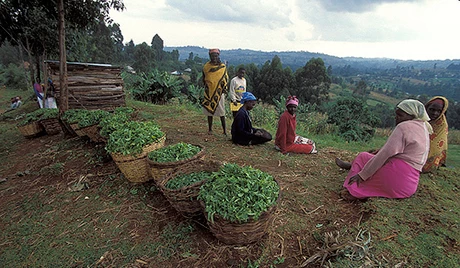A few weeks ago, we passed a big milestone in the World Bank Group’s climate change and development work. For the first time, small-scale farmers earned carbon credits from an agricultural land management project.
The project in western Kenya kicked off what will surely be many more soil carbon projects in coming years. It also shows how sustainable farming (such as increased mulching and less tilling) can be part of the global effort to reduce greenhouse gas emissions – while improving livelihoods for poor, rural families.
The soil carbon project, made possible by an accounting system for low-carbon farming approved in 2011, took several years to prepare and implement. I had the fortune to be right there, working with farmers on the ground in Kenya and trying to understand their reality.
Our first challenge: Figuring out how to identify the priorities of farmers and to match them with emerging carbon programs for the benefit of all.
Because I had worked at the secretariat of the United Nations Framework Convention on Climate Change, the question of how to extend technological expertise to users on the ground was familiar to me.
When we first started talking to Vi Agroforestry, a Swedish NGO that works with farmers in Kenya, I realized we were looking at an opportunity. This project could allow farmers to benefit, for the first time, from the complex processes associated with carbon credit issuance.
But we were starting from scratch, which is a challenge in and of itself. We needed to develop a new methodology under the Verified Carbon Standard for this project since we were talking about a new way for farmers to earn carbon credits.
Meeting the rigors of the VCS standard while at the same time keeping the methodology simple enough for farmers to understand and implement was crucial. Tweaking our project methodology to meet such needs took time and in the meantime we faced questions internally and externally about the slow pace of progress.
Here are my take-away lessons from the Kenya sustainable agricultural land management project:
Keep it Simple: It’s not always possible, but try to simplify and demystify as you move along. We did this for the methodology developed under the VCS. More recently, an e-learning course was developed to share technical concepts in a simple manner with a wide variety of stakeholders. The response has been overwhelming.
It takes time: Integrating carbon finance operations into the development paradigm requires time and patience. If you rush it, it’s easy to mess it up. If you go too slow, you can lose momentum and support. Striking the right balance and creating ownership is important. In our case, we involved the farmers from the get-go. They themselves monitor implementation and progress and use the methodology as a planning tool for their crops.
Talk to people: The most critical element, of course, is keeping your ears to the ground. Listen to the priorities of people affected by your project. Everything else needs to build around this. In our case, the top priority for farmers is increased crop production, which translates into increased cash flow. The revenue from carbon credits is viewed as an-add on and hinge on a climate-friendly crop production.
So far in Kenya, we’re seeing yields increase by as much as 20 percent as a result of the improved farming.
Or as one farmer said, “With this project, I get more tins of maize than I did before,” and that’s what really matters.
In the process, there is adaptation to a changing climate, and reduced greenhouse gas emissions. The farmers come out more resilient and contribute to an improved environment. This project is proof that we can leverage carbon finance in a meaningful way and replicate it at scale.
We have shown that carbon finance is not just an esoteric concept. We took it to the farmers and they are better off for it. The next step is linking farmers to produce markets. So stay tuned…



Join the Conversation